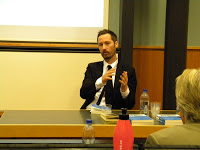I was ever planning to write English posts on this blog. There is no better chance to start it than now: on Friday (October 14) I participated on the PhD defending process of Stefan Larsson, a great legal sociologist at the Lund University, Sweden. His thesis was titled “Metaphors and norms: Understanding copyright law in a digital society”, and he discussed file-sharing from an uncommon and great perspective.
Interestingly (at least to me, to a Hungarian) the first half Stefan’s thesis was a precise summary of the research results of his four relatively recent articles. The second half of the book contained these articles. (As it turned out to me, it is called a “compilation thesis”.) This means that the readers of the thesis had to go through the research results first and the source articles only after that. It is possible put together the puzzles of the whole concept this way. (But it doesn’t mean that the thesis is not well structured.) Since I already read two articles from Stefan (I wrote reviews of them on this blog, see them here and here, but only in Hungarian, sorry folks), the task to finish the puzzle game did not cause too much troubles to me.
Stefan decided to focus on one of the most fascinating topics of the digital copyright context, and this is file-sharing. However, since Stefan is a legal sociologist, his thesis discussed the topic quite differently than an IP lawyer would do. He argues that there are legal norms and social norms side-by-side. Legal norms try to regulate several different social phenomena, whilst social norms reflect the society’s perception of these phenomena. Both legal and social norms are based upon “a cluster of metaphors”, where each metaphor is a mixture of language (the selected words) used in relation to and personal experiences on a specific issue. To use one example – that had a central role in the dissertation –: copyright holders like to call file-sharing “theft” and file-sharers “pirates”, to indicate that it is the illegal appropriation of others’ property (BTW a work – the physical embodiment of a creation – as property is another metaphor, though not all IP lawyers accept it). File-sharers definitely think it the opposite, and pirates in their sense are people who simply try to get access to media content, without committing any crimes or infringement.
This example clearly shows: there can be serious differences between the legal and the social perception of a specific phenomenon. The question therefore comes: which “norm” should prevail: the legal or the social? Stefan argues that
(1) the metaphors that the current copyright norms are built upon were construed in the “analogue age”, and therefore they have to be reconsidered (or as Stefan says: we need to create “skeumorphs” that fit to the present age);
(2) the existence of these archaic metaphors (archaic thinking about and old-fashioned perception of the digital age) is due to the path-dependent nature of copyright law (as Stefan argued on the oral defending process: it is one of the hardest thing of the world to reform the copyright law; or as Jessica Litman in his great monograph stated: „the ways we have of thinking about copyright law can at least make some changes more difficult to achieve than others”);
(3) if the legal norms try to cover/regulate a social phenomenon in a way that is simply neglected by members of the society, the legal norms will lose their credibility;
(4) having a disregarded legal norm on the one side and an illegal, but heavily accepted/followed social norm on the other side inevitably results a serious gap between the two norms;
(5) this gap than simultaneously leads to social and legal reactions. The short history of file-sharing showed that these reactions do not necessarily lead to the resolution of the problem. As Stefan discussed it in three different articles attached to the thesis: copyright law, on the one side, is path-dependent, to put it differently: copyright law tries to solve the problems within its existing boundaries; and, on the other side, (1) the belief of normative rules do not necessarily strengthens just because new legal norms are created and (2) members of the society look for alternative methods to satisfy their needs, like services that provide online anonymity or the safer cyberlockers.
To sum up: Stefan’s dissertation perfectly witnesses the difficult coexistence of the rightsholders’ and the average people’s interests in the digital age. The doctoral thesis stops here, but the discussion definitely will have a continuation – at least in my book. I am currently writing my own book on file-sharing, where I am planning to discuss why the legal norms (related to file-sharing) are following a bad path nowadays. And since I agree with many points Stefan highlighted in his thesis I will definitely cite his results in my monograph.
Congratulations Stefan, once again.
Stefan’s thesis is available here. (This way you may have access to all the four articles included in the book. You may look for other interesting stuff on the topic at the Cybernorms research groups’ website here.)



One thought on “My perception of Stefan Larsson’s „Metaphors and Norms””